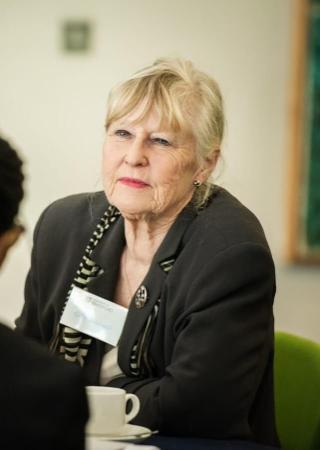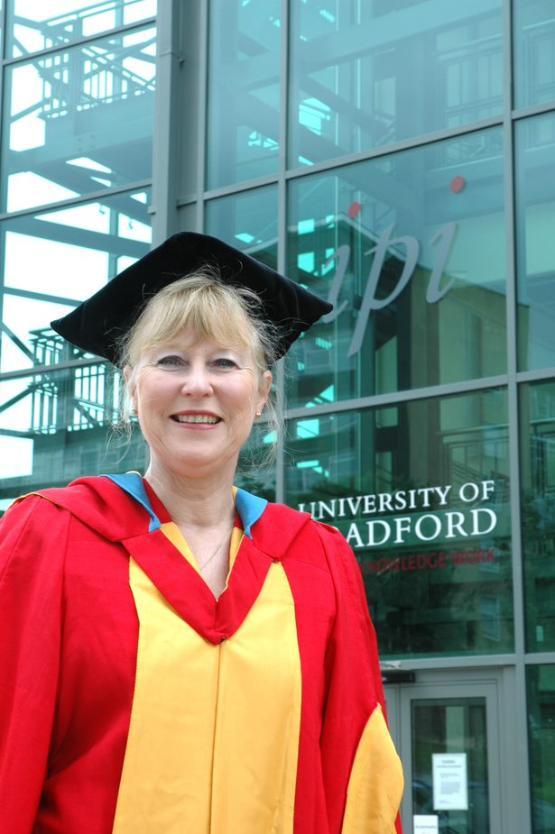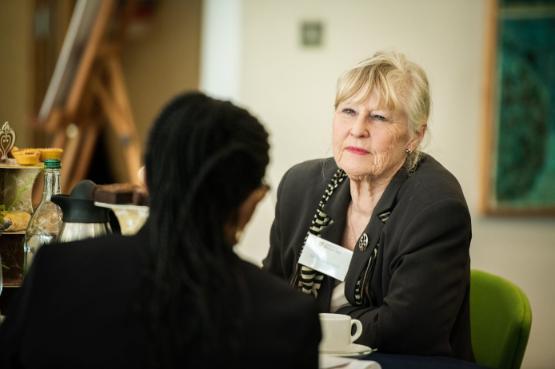Q&A with Dr Gill Hawksworth MBE
Gill first registered as a pharmacist in 1974 following the completion of her degree at the University of Bradford in 1973. She opened her own pharmacy in Yorkshire in 1986 and then returned to the University of Bradford and completed her PhD in 1999. She later went on to become a senior lecturer at the University of Bradford for several years and then continued in that role at the University of Huddersfield.
Gill was a member of the Royal Pharmaceutical Society (RPS) Council from 1992 until 2000 and became a Fellow of the RPS in 1997. Gill continued to be recognised for her commitment to pharmacy, winning the Schering Award in 1999. She was awarded an MBE for services to pharmacy in 2002. In 2017 she won the RPS Lifetime achievement award.
Gill has supported the University through donations made towards the 50th Anniversary Scholarship appeal, and more recently the Bradford Futures Fund.

Why did you choose to come and study at the University of Bradford?
I chose to do my Pharmacy undergraduate degree at the University of Bradford in the early 70s because it was in Yorkshire and, in my view, the best course. It was the first year they were introducing a sandwich course which at the time was very unusual and I was also impressed by the good reputation of Bradford, the excellent teaching staff, and the quality of the course.
I was very honoured to be taught and significantly influenced by Professor Geoffrey Booth, who founded the UK’s first department of Pharmacy Practice at the University of Bradford and went on to become the national President of the Royal Pharmaceutical Society.
What are your favourite memories from your time at the University of Bradford?
I am still in touch regularly with several people who were on my course, some of whom have also donated towards the University. We all recall the memorable staff from our course and the excellent practical classes with support from postgraduate students. In 1973, after our undergraduate degree ceremony in the large hall, I remember many of us had our photograph taken next to a sapling tree that had just been planted next to the car park outside where the large lobby in the Richmond building is now. In 1999 when I was once again receiving an award – my PhD – the tree had matured and grown in stature much like I had in my career. My final memory of that tree was in 2005 when I received my Honorary Doctor of Science and the tree appeared even more established with its roots firmly secured, just like myself.
How did your career progress after graduating?
After graduating, I completed my preregistration experience in hospital pharmacy and then moved into community pharmacy, first as a manager and then as a proprietor of my own pharmacy for 16 years. It was a shock moving from the team working in hospital to working on your own as a community pharmacist, so I also then took on the role of tutor for the Centre for Pharmacy Postgraduate Education (CPPE), a role I continued in for thirty years. This excellent experience in education led me eventually into academia, becoming a lecturer at the University of Bradford for several years where I became very aware of students who needed financial support but who eventually went on to have very rewarding careers. I subsequently worked at the University of Huddersfield, and I am currently a Visiting Professor there.
What have been the achievements in your career that you have been most proud of?
I followed the career of Professor Booth in that I was elected to the council of the Royal Pharmaceutical Society of Great Britain (RPSGB) in the early 90s and became a Fellow of the RPSGB in 1997. I continued to work as a community pharmacist in my own pharmacy whilst doing my PhD at the University of Bradford, and I was very privileged to be awarded an MBE for my service to my community as a community pharmacist just before I became the RPSGB national President in 2003. It was a great honour to then be awarded an honorary degree by the University of Bradford in 2005.
I was involved in the work of the RPSGB in many roles in education, science, and practice for many years, and later after it became the Royal Pharmaceutical Society (RPS) I was also proud to be appointed chair of the RPS Panel of Fellows.

Dr Gill Hawksworth MBE receiving her Honorary Degree from the University of Bradford in 2005.
If you could give your younger self any advice, what would it be?
During my career right from being an undergraduate Pharmacy student at the University of Bradford up to the present time, I have been on an incredible journey which has helped me to discover exactly what I could achieve.
So, what lessons have I learned on my journey that can help others in their future careers? There are many but I would like to briefly share just two key messages.
The first is that, on reflection, I believe that real learning opportunities and influences should emanate from your work. In addition, several key elements in life are crucial in order to implement a strategy designed for one’s success. Those key elements are now clear to me and are leadership, knowledge, perseverance, strength, and celebration of achievement.
The second and most important is that those individuals, male and female, whose professional achievement, is admired the most, appear to have a number of qualities in common: a clear sense of self, a desire to achieve excellence, a positive outlook that is focussed on opportunities and outcomes, an extra-ordinary will and capacity to share their insights, wisdom and skills with others, and the capacity to balance transactional work with transformational work and an apparently infinite capacity for innovation.
What inspired you to donate to the University of Bradford?
When I went to university, I was in a similar position to many of the students that the scholarships are now supporting. In those days I was lucky enough to be eligible for a full student grant due to my family circumstances, which I was very grateful for. I always worked hard to demonstrate great commitment to my studies because I appreciated the value of the university education that I had been gifted.
I wanted to become a donor to help University of Bradford students in financial crisis or in a similar situation, to give them the chance to succeed in their chosen career just as I did.

Dr Gill Hawksworth MBE attending the University's Donor Celebration event in May 2022.
What would you say to fellow alumni who may be considering donating to the University?
I have been to some donor events where students, who have been supported by donors, have presented their story and it is very rewarding to know that in some small way I may have helped them on their journey. It is encouraging to think that by supporting the University of Bradford in this way, I will be able to help transform someone else’s future.
